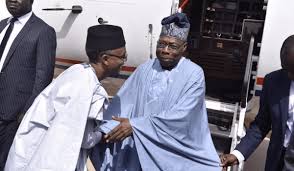
Former President Olusegun Obasanjo has revealed that he declined a proposal to make former Kaduna State Governor, Nasir El-Rufai, his successor in 2007, citing El-Rufai’s lack of maturity at the time.
Obasanjo made this disclosure on Friday, October 24, in Abeokuta, Ogun State, during the second edition of the Ajibosin Platform Annual Symposium themed “The Importance of Leadership in Governance.”
According to the former president, the suggestion came from former Minister of Aviation, Osita Chidoka, who had recommended El-Rufai as a potential successor. El-Rufai had served in Obasanjo’s administration as the Director-General of the Bureau of Public Enterprises before becoming Minister of the Federal Capital Territory between 2003 and 2007.
Recounting the exchange in a humorous tone, Obasanjo said, “He was pushing when I was leaving government that his friend, El-Rufai, should be brought in as my successor.” Turning to Chidoka, who was seated among the panelists, he asked, “No be so?” to which Chidoka nodded in agreement.
“I did not yield to the pressure,” Obasanjo continued. “Later, he asked me why I didn’t agree. I told him El-Rufai needed to mature. Years later, after seeing El-Rufai’s performance, he came back and said, ‘You were absolutely correct. El-Rufai needed to mature.’”
While noting that he had great respect for both El-Rufai and Chidoka, Obasanjo described them as men of “special attributes” who made valuable contributions to his administration.
Speaking further on leadership, the former president emphasized that effective leadership requires character, experience, exposure, and training. “It’s only in politics that I found there is no training for leadership,” he said. “Even among armed robbers, I was told there is apprenticeship. But in politics, there is none — and that’s not good enough.”
Delivering his keynote address, Chidoka argued that Nigeria’s governance challenges stem from what he called “the politics of alibi,” where leaders rely on excuses rather than accountability. He stressed that leadership should be judged not by charisma but by the systems it builds.
“Leadership finds its true measure not in charisma but in the systems it leaves behind,” Chidoka said. “Nigeria’s problem has never been a lack of ideas, but the absence of systems strong enough to outlive their authors.”
He urged leaders to prioritize measurable outcomes and build accountability-driven institutions to ensure sustainable progress.
The symposium’s convener, Aare Olanrewaju Bakinson, said the event aimed to foster meaningful discussions on ethical and effective leadership. “Leadership is not about power; it’s about responsibility, vision, and service,” he said.
Dignitaries at the event included Senator Shuaibu Salis (Ogun Central), the Olowu of Owu Kingdom, Oba Saka Matemilola, the Olota of Ota, Oba Adeyemi Obalanlege, and former Ogun State First Lady, Mrs. Olufunsho Amosun.


